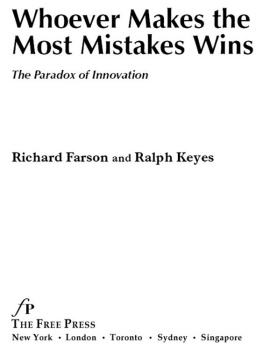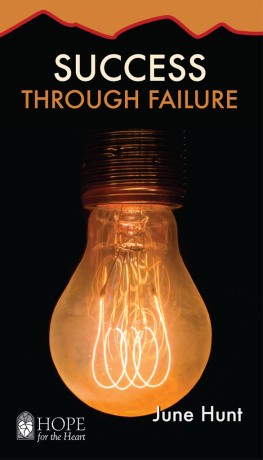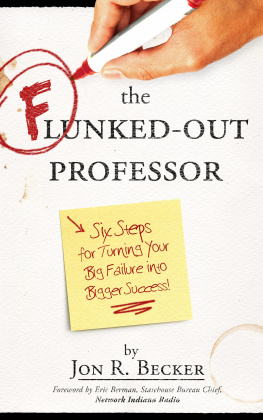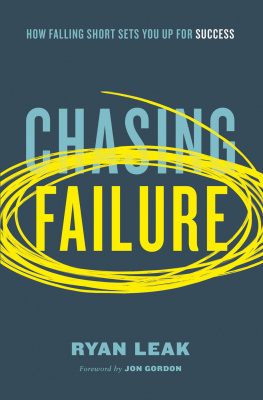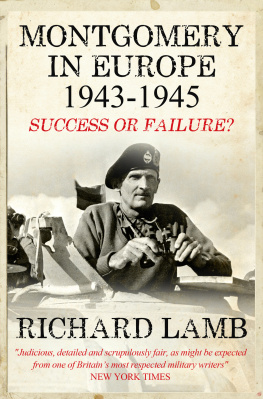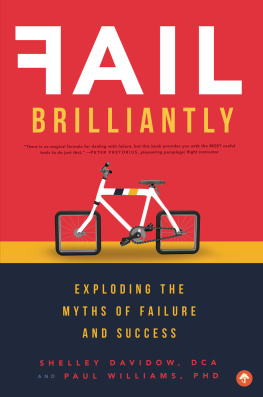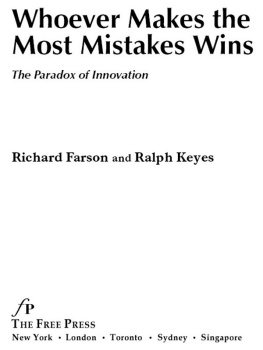For ideas that contributed to our own thought processes: Carlos Campbell, Michael Crichton, Dawn Farson, Hallock Hoffman, Doug Land, Kate Ludeman, Jim OToole, Edwin Nystrom, Alex Soojung-Kim Pang, Charlton Price, John Shlien, Jim Skelly, Hall Sprague, Andrea-Lawrence Stuart, and Susan Waitley.
For helpful critiques of an early version of the manuscript: Andrea Adkins, Lou Heckler, and Robert Scherer.
For acute editing: Noel Greenwood and Burton Beals.
For encouragement and helpful suggestions, including the suggestion that we write this book: Margret McBride, the agent who represented it.
For capably shepherding the book to publication: our editor, Fred Hills.
1. The SuccessFailure Fallacy
One must be God to be able to distinguish successes from failures and not make mistakes.
Anton Chekov
A management consultant wrote a brief bio for his thirtieth college reunion. In it, he included the usual information: work, family, achievements. By most measures, this man was unusually successful. He was the father of thriving children, head of a respected think tank, and author of a best-selling book. After reviewing his paragraph, however, the consultant realized that it read more like a resum than an honest report to his classmates. Why would I write such a stilted, half-true account of my life for friends who knew me when? he asked himself.
As a lark, the consultant decided to write a longer, more candid report about what his life had actually been like. It began:
Because I didnt receive a single A in college, I couldnt get into medical school. Instead, I worked as a lifeguard, but got fired at the end of the summer. My next job, selling advertising in the Yellow Pages, was interrupted by breaking my leg badly while skiing. This gave me three months to think about what to do with my life. Since Id enjoyed my psychology courses in college, I thought I might try to become a school psychologist. So, I enrolled at UCLA to pick up psychology and education courses, but got kicked out of student teaching because I couldnt get along with my supervisor. Back to lifeguarding. Then I noticed that a prominent psychologist was giving a summer seminar at my alma mater, so I quit my job and enrolled. This experience was electrifying. The psychologist invited me to study with him at the University of Chicago. I was so intimidated by that most serious academic institution, however, that I put off going there for a year. Just before receiving my Ph.D. from Chicago, I was given a one-year fellowship on the Harvard Business School faculty. I left there at the end of the year with almost everyone mad at me.
The report went on like this for several paragraphs. Far from being a description of a smooth, upward trajectory, it portrayed a jagged course of life events. Failures mingled with successes, triumphs with setbacks. The consultants full bio was a litany of opportunities seized, others blown, jobs taken, jobs lost, personal rebuffs, standing ovations, love affairs, marriage, divorce, remarriage, making Whos Who, getting fired, starting a think tank, making money, going broke, having a heart attack, learning piano, publishing booksand on and on. His failures led to successes and successes to failures. The two were so interdependent that it wasnt always clear which was which. So it is in most lives.
Tangled Line
Whose life can be located precisely on the map of success and failure? Sometimes, what seems to be a success at one point proves to be a failure at another. Premature promotions set one person up for a fall. Getting fired forces someone else to start a profitable business. A marriage made in heaven cant survive hellish periods. A rotten first marriage propels both partners into terrific second ones. Life-threatening illnesses can jolt survivors into living more fully. (Best thing that ever happened to me!)
We like to think you either succeed or fail. Most situations are more ambiguous, however. So are most people. Hes a success, we say. Shes a failure. On whose terms? At what stage of life? How can we be so sure? Winston Churchill, after all, was considered by many to be a pompous failure until he became prime minister of Great Britain during World War II.
Were too quick to call someone or something a success or a failure when the jury is still out (which is true in most cases). These two are simply not that easy to sort out, untangle, tell apart. All they are is labels we hang on complex events trying to simplify them. What we usually end up doing is oversimplifying them. When we win and when we lose can be utterly dependent on circumstances, timing, the economy, even shifts in the public mood.
Remember Edmund Muskie? When he ran for vice president in 1968, Maines Lincolnesque senator was considered the most impressive member of either ticket. Four years later, he was the leading candidate in the Democratic presidential primaries. Then, on a snowy day in New Hampshire, Muskie choked up while protesting press attacks on his wife. Televised images of the senator from Maine tearfully addressing a rally with snowflakes clinging to his eyebrows horrified American viewers. We didnt want a crybaby in the White House! That single incident scuttled Muskies political career. He had failed.
Fast forward twenty-eight years. Al Gores campaign for president was floundering. The knock on him: He was too stiff, too wooden. Gores feelings were stored in a lockbox. He never got misty-eyed, likewelllike Ed Muskie!
In a different time and place, Muskies catastrophic failure might have been considered a roaring success. If Maines senator had been campaigning in the age of Oprah, his tearful outburst might have won him plaudits. Muskie would then have been viewed as a devoted husband and passionate candidate who could communicate soulfully with the American public.
Failure and success can be utterly dependent on such intangibles. Luck happens: good and bad. The fabulously wealthy J. Paul Getty said his success formula was Rise early, work late, strike oil. As Getty realized, success or failure in business can have little to do with anything done by design. On a given new project everything might seem to be in place, ducks all lined up, every detail checked out. Then, some unexpected meteor lands on that project. A well-designed SUV might be launched just as soaring gas prices revive demand for more fuel-efficient vehicles. A surefire best-seller gets published right after New York Times reporters go on strike, taking its best-seller list with them. Or things might break the other way. A chance encounter at a class reunion leads to a big contract. The unexpected failure of a competitor opens new markets for your product. If the inventor of a computer operating system called CP/M had accepted IBMs invitation to pitch his product rather than go on vacation, Bill Gates might be a small-time Seattle software merchant rather than the developer of MS-DOS (which IBM bought instead) and one of the worlds richest men.
Now we all can agree that Gates did succeed, big timeright? Well, not everyone. It took Mary Gates years to reach that conclusion. Long after Microsoft was flourishing, Mrs. Gates considered her son Bill a failure because he had dropped out of Harvard. Traditionally, thats what dropouts have been considered: failures. In the midst of an economic revolution led by college dropouts such as Bill Gates and Steve Jobs, however, this attitude is changing. As Mary Gates eventually conceded, leaving collegeeven Harvardmay simply reflect a shift in priorities.
Says Who?
Success, failure: Whos to say? These are much more ambiguous concepts than is suggested by success seminars, management texts, or performance reviews. The terms defy definition. Each one of us has a concept of success as unique as our fingerprints. Appearances aside, its rare for anyone to achieve every measure of success as he or she may define that word. Despite what is written in annual reports and Christmas newsletters, unqualified success and clear-cut victories are rare. Most lives include few pure successesor failures. Most must be qualified one way or another. Thats why people who appear successful seldom feel successful. They know that what others perceive as their success is more of a mixed bag and, to some extent, undeserved.

